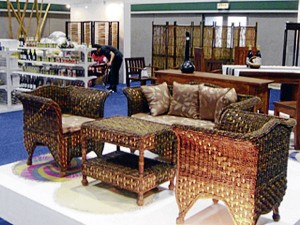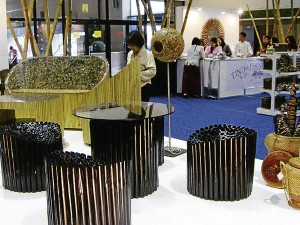OTOP products get a place all their own

Over the past years, bazaars—more popularly known as tiangges—have gained a following. Christmas, it seems, is not the only season for wallet-emptying shopping. Bazaars are everywhere and they are there almost all year round.
Tiangges are relatively easy to set up. For small entrepreneurs, these bazaars are the best way to bring their products to market sans the burden of overhead expenses.
But since most bazaars are temporary—mostly there during payday weekends and the run-up to the Christmas season—small business owners are unable to build a loyal client base—unless they join almost every bazaar possible, from the metro to the provinces. Small enterprises in the provinces have an even harder time breaking into more mainstream markets.
These are what the Tindahang Pinoy project of the Department of Trade and Industry hopes to remedy. Launched early this month, together with the Micro, Small, and Medium Enterprise (MSME) Development Plan 2011-2016, the Tindahang Pinoy is designed to improve market access for products under the DTI’s One Town, One Product (OTOP) program.
President Benigno Aquino III, in a speech delivered for him by Trade Secretary Gregory Domingo, said the Tindahang Pinoy outlets would help take the place of the “temporary tiangge” as a venue for selling OTOP products.
Increased market access

The Tindahang Pinoy outlets will sell products from various MSMEs nationwide. These will be run by the private sector, with the DTI providing the suppliers and arranging the logistical requirements through third-party providers.
“Later on, we’ll be franchising the Tindahang Pinoy brand, which will be handled by the (Philippine Trade and Investment Center),” Trade Undersecretary Merly Cruz relates.
In terms of participating MSMEs, she says the top 30 highest sellers in DTI trade fairs would be included in the lineup of products to be sold in Tindahang Pinoy branches.
Initially, Tindahang Pinoy branches will be opened in Clark, Cebu, Davao, and Cash and Carry in Makati.
At the SME summit held earlier this month at the Philippine Trade Training Center, the DTI set up a sample of the Tindahang Pinoy, which featured a wide range of both edibles and non-edibles from Luzon all the way to Mindanao.
Among the products sold there were woven bags and mats made of various indigenous materials, bead accessories, processed and bottled fish products, herbal teas, local coffee, and even native furniture.
Grand plan
The Tindahang Pinoy program is just one part of the government’s overall efforts to give MSME development a huge boost. The MSME Development Plan 2011-2016 maps out government’s goals and objectives for the MSME sector, as well as the concrete steps that should be taken to achieve these.
The launch of the Tindahang Pinoy stores aims to expand market access for MSMEs. Under the MSME Development Plan, Cruz says the overall strategy went beyond just market access. The government also emphasizes the need to make the local environment more conducive for doing business, improve access to financing, and boost the productivity and efficiency of MSMEs.
In improving the business environment, Cruz says the groundwork had already been laid by the DTI, particularly in simplifying the business name registration process and streamlining various processes associated with securing permits and licenses. Partnerships with local government units were also being forged to ensure a business-friendly environment for MSMEs.
Access to financing would likewise be improved, she says, by working together with both government and private financial institutions for the extension of loans to bankroll various MSME projects.
Small Business Corp., a GFI focused mainly on MSMEs, for example, is providing risk-based financing to small businesses. The Development Bank of the Philippines, Land Bank of the Philippines, Bank of the Philippine Islands, Metropolitan Bank and Trust Co., and Banco de Oro likewise have a “green financing” window for MSMEs.
“The desire of the government is to simplify access to financing. We want to zero in on (overseas Filipino workers) from Saudi Arabia who have been displaced and who will be displaced (by Saudization),” Cruz says.
Through these efforts, she says the government hopes to generate at least two million jobs from this year to 2016 via MSMEs. Job generation for this year alone is expected to reach 340,000.
The MSME Development Plan likewise aims to jack up the gross value added of MSMEs to 40 percent from the current 37.5 percent, Cruz says.
Measure of economic contribution
To measure just how much MSMEs are contributing to the economy, Cruz relates that the DTI has asked the National Economic and Development Authority for a concrete formula it can use to make this computation.
She explains that while it was evident how much MSMEs were contributing to the economy, judging by their sheer number and the vastness of their reach across the country, there is yet no gauge for the absolute contribution of MSMEs to the economy.
According to government data, MSMEs constitute around 98 percent of all registered firms in the Philippines, employing at least two-thirds of the labor force and contributing at least 30 percent of the country’s output.
While MSMEs may not account for a large bulk of product and service revenues, it provides jobs to thousands of Filipinos, both directly and indirectly.
